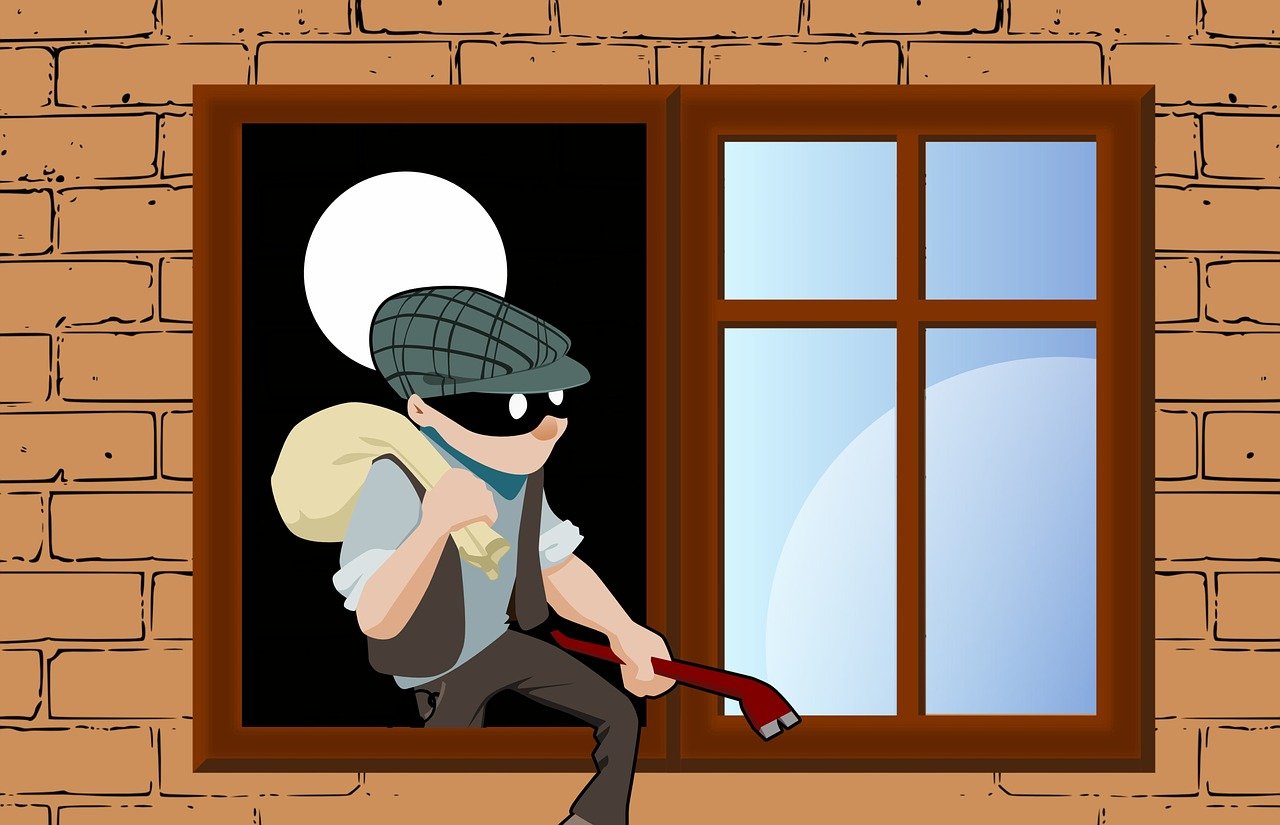To figure out which houses burglars target and which ones they stay away from, it helps to think like a burglar.
Which houses present the best opportunity for a break-in and which ones carry the most risk? This will give you some ideas on how to make your home secure from burglars.
Which Homes Do Burglars Avoid?

Burglars target homes that offer the least risk and the most opportunity. If there’s too much risk of getting caught, they’d rather find another house.
You’d be surprised at some of the things that keep burglars away. For instance, a ‘beware of dog’ sign can be a really good deterrent. And so can having next door neighbours.
Here are the kinds of homes burglars generally avoid because they are risky or difficult targets.
Homes With Visible Security Measures
The first thing burglars look for when casing a house is what kind of security is there. If they cannot see any visible security measures, they are more likely to break in.
So a great way to make your home unattractive to burglars is to have easily visible security deterrents in place.
Security cameras are a must-have. Make sure they are prominently placed around your home, providing coverage from every angle. If you don’t have the budget for security cameras right now, you can get some pretty convincing dummy cameras.
Burglars also look out for signs of alarms. If the alarm is not clearly visible from the outside, put up a sign indicating that your home has an alarm system (put up the sign even if you don’t have an alarm).
Burglars will also avoid homes that are well lit at night. So if they notice lots of lights around the exterior, they are less likely to strike at night.
Having visible security lights is also an indication that you are a security conscious homeowner and they’d rather not risk it.
Homes With Dogs
Most burglars would rather not deal with a dog. Even a small dog that barks loudly will deter them. The last thing they want is to attract attention.
Burglars will generally avoid homes with dogs. Sometimes, even a ‘beware dog’ or ‘don’t open gate, dog in the yard’ sign can be enough to discourage a burglar, whether you have a dog or not.
Of course, having a dog is not foolproof. Determined burglars can find ways to deal with a fierce dog. They can also case your home and realise you only have a sign but there’s no dog.
That’s why it’s a good idea to combine multiple deterrents. One of them is bound to scare potential burglars.
Homes That Are Visible From The Street
Burglars tend to avoid homes where the front door and the windows are easily visible from the street. They don’t want to risk a passerby or neighbour catching them in the act.
So be careful with your landscaping. Avoid having trees, pots or shrubs hiding your front door or a window that burglars can get in through.
A high privacy fence or hedge can also encourage burglars to break in since they’ll have all the privacy they need to do their business.
Houses That Are Difficult to Break To
Burglars can usually tell which houses will be easy to break into. At a glance, they can assess how sturdy or secure your doors and windows are. Sometimes they’ll also walk right up to your home and test the lock as they also look for other easy entry points.
They will avoid any home that looks difficult to break into. A strong front and rear door, proper locks (including deadbolts) and window bars will all discourage burglars.
If you have a gate leading to your home, make sure it stays locked all the time.
Walk around your home and try to spot any entry points that a burglar can take advantage of. A sliding door is usually easy to defeat. Either make it more secure or replace it
Garages are also common targets. Adding an extra security measure such as a garage door defender can make your home less attractive.
Which Homes Do Burglars Target?
Here’s a video of an ex-burglar explaining what they look for when targeting homes.
Basically, they target homes that have or do the opposite of what we’ve discussed above.
For example, if there’s no alarm or dog beware sign, they’ll assume you have minimal security. The lack of visible security cameras also makes your home a target.
Other factors that make your home more likely to be targeted include bushes or trees hiding the front door, a high privacy fence or hedge and lack of security lights.
Burglars will also try to assess how secure the doors and windows are. Does the front or rear door have glass they can break to unlock the door?
Do your doors have flimsy locks that are easy to pick or break? Can the windows be forced open?
Burglars will also try to spot if there’s anything in your home worth stealing. They’ll peep through windows or watch deliveries to your home.
If they notice a band new 65 inch TV or nice kids bike, your home becomes a bigger target. That’s why keeping your valuables out of sight is important. If thieves don’t think there’s anything valuable, they are less willing to take a risk breaking in.
Here are a few more things to keep in mind.
- Homes next to empty lots are more likely to be broken into. If you are buying a new home, find one with immediate neighbours.
- Burglars will take time to watch your routine. If you leave home and come back at the same time everyday, it’s easy for them to pick the perfect time to break in. If you cannot alter your routine, find ways to boost security when you are not home or make it seem like there’s someone at home.
- Don’t make things too easy for burglars. Make sure you lock the doors, windows and gate. Burglars will sometimes walk to your front door, knock to make sure there’s no one home and then test to see if it’s open. If you tend to forget to lock, get a smart lock.
- If burglars know there will be no one home for days or weeks, that’s a great opportunity for them. So don’t announce when you are going away on holiday. And when you go, use things like smart lights to make it seem like there’s someone home.
- Another tip for when you plan to be away for some time is to have your mail and packages held. If they build up on your front door, burglars will know there’s no one home. They can also steal the packages. Leaving your mail in the open also poses the risk of identity theft.
How To Prevent Repeat Burglaries
Another type of home that burglars find attractive is a home they’ve already broken into. A surprising number of burglary victims are targeted again, sometimes more than twice.
There are several reasons why burglars tend to go back to the same house.
For one, they are already familiar with it and this greatly reduces the risk of getting caught. If you haven’t changed anything about your home security since you were last robbed, it’s a cakewalk for the burglars.
The burglars may also have left behind some valuable products the first time they broke in. This is an incentive to come back and take what they couldn’t.
Burglars also know that homeowners often replace what was stolen with something of equal value or better. So they’ll wait for sometime and then come steal the replacements.
If you’ve already fallen victim to a burglary, you are at a high risk of a repeat break-in if you don’t do anything. Do not wait too long before upgrading your home security.
Figure out how the burglars came in and address that weak point first. Don’t repair the door or window to the way it was initially — make it stronger and more secure.
Next, assess your overall security and see where you can make improvements. Remember the three Ds of burglar protection: deter, delay, and detect.
Having a dog, security lights, security cameras, warning signs and an alarm will deter the burglars, hopefully preventing them from even attempting a break-in.
Strong doors and secure locks will delay the burglars should they attempt to break into your home. In many cases, they’ll give up and walk away.
As for detecting, the alarm and security cameras are perfect for that.
Just in case the burglars manage to get inside the house, keep your most important valuables well secured and hidden. Get a good quality safe or hide things where they are hard to find (e.g. fake books and other decoy items).
If you have really valuable items, consider keeping them somewhere safer away from home such as a bank safe deposit box.







